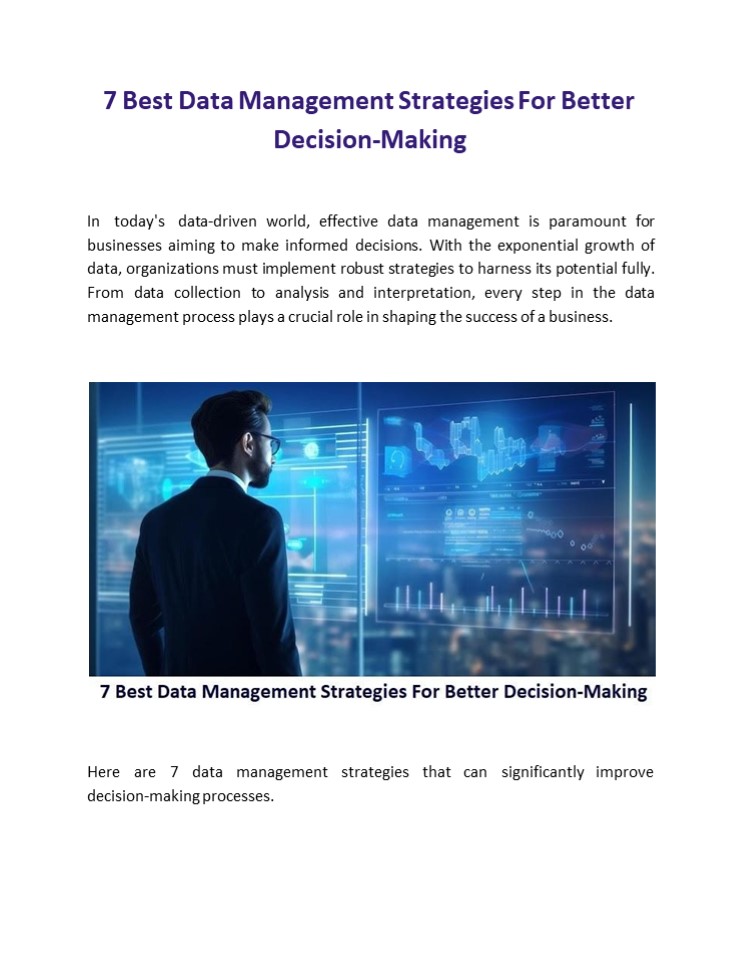7 Best Data Management Strategies For Better Decision-Making - PowerPoint PPT Presentation
Title:
7 Best Data Management Strategies For Better Decision-Making
Description:
Efficient data management is necessary to fully utilize data and promote improved decision-making procedures. Here are 7 data management strategies that can significantly improve decision-making processes. EnFuse Solutions India offers valuable expertise and solutions to support businesses on their journey toward optimized data management and enhanced decision-making capabilities. Get in touch today! – PowerPoint PPT presentation
Number of Views:2
Title: 7 Best Data Management Strategies For Better Decision-Making
1
7 Best Data Management Strategies For Better
Decision-Making
In today's data-driven world, effective data
management is paramount for businesses aiming to
make informed decisions. With the exponential
growth of data, organizations must implement
robust strategies to harness its potential fully.
From data collection to analysis and
interpretation, every step in the data management
process plays a crucial role in shaping the
success of a business.
Here are 7 data management strategies that can sig
nificantly improve decision-making processes.
2
- Define Clear Data Management Objectives Before
diving into the intricacies of data management,
it's essential to define clear objectives aligned
with the organization's goals. Whether
improving operational efficiency, enhancing
customer experience, or gaining a
competitive edge, having well-defined
objectives will guide your data management
efforts. To ensure coherence and effectiveness,
emphasize the importance of aligning data
management strategies with broader business
objectives. - Implement A Robust Data Management System A
reliable data management system is the backbone
of any data-driven organization. It includes
procedures, guidelines, and tools to manage data
effectively throughout its lifespan. Leveraging
advanced tools and platforms can streamline data
collection, storage, processing, and analysis. A
robust system ensures data accuracy, integrity,
and security while facilitating seamless access
for decision-makers. - Embrace Data Quality Assurance Poor data quality
can lead to erroneous conclusions and misguided
decisions. Hence, implementing stringent data
quality assurance measures is crucial. This
includes data cleansing, normalization, and
validation to eliminate inconsistencies and
inaccuracies. By ensuring data reliability and
completeness, organizations can enhance the
trustworthiness of their insights and drive
more informed decision-making processes. - Utilize Advanced Analytics Techniques Data
analytics plays a pivotal role in extracting
valuable insights from vast datasets. Leveraging
advanced analytics techniques such as predictive
analytics, machine learning, and artificial
intelligence enables organizations to uncover
hidden patterns, trends, and correlations within
their data.
3
- By harnessing these insights, businesses can
anticipate future trends, identify potential
risks, and capitalize on emerging opportunities,
driving more proactive decision-making. - Promote Data-Driven Culture Fostering a
data-driven culture is essential for ensuring
that data becomes a central component of
decision-making processes across all levels of
the organization. This entails fostering
data-driven conversations, providing incentives
for data-driven behaviors, and raising staff data
literacy. EnFuse Digital House emphasizes the
importance of creating a culture where data is
valued as a strategic asset and utilized to drive
innovation and growth. - Invest In Continuous Training And Development
With the rapid evolution of data management
technologies and methodologies, continuous
training and development are imperative to keep
pace with the latest trends and best practices.
Investing in training programs, workshops, and
certifications equips employees with the
necessary skills and knowledge to effectively
leverage data management tools and techniques.
EnFuse Solutions offers comprehensive
training programs tailored to the specific needs
of organizations, ensuring that employees are
equipped to maximize the value of their data
assets. - Regularly Evaluate And Update Data Management
Strategies Data management is not a one-time
endeavor but an ongoing process that requires
regular evaluation and optimization.
Periodically assessing the effectiveness of
data management strategies allows organizations
to identify areas for improvement and adapt
to evolving business needs and technological
advancements. By staying agile and responsive,
businesses can ensure that their data management
practices remain aligned with their overarching
goals and objectives.
4
Conclusion Efficient data management is necessary
to fully utilize data and promote improved
decision-making procedures. By defining clear
objectives, implementing robust systems,
ensuring data quality, embracing advanced
analytics, fostering a data-driven culture,
investing in training, and continuously
evaluating strategies, organizations can
position themselves for success in today's
data-centric landscape. EnFuse Solutions India
offers valuable expertise and solutions to
support businesses on their journey toward
optimized data management and enhanced
decision-making capabilities. Get in touch
today! Read More Streamlining Data Management
With Digital Asset Management (DAM) A Practical
Approach































